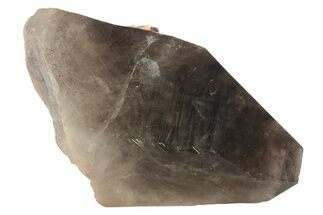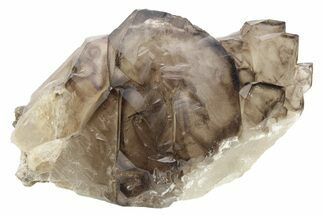This Specimen has been sold.
3.8" Lustrous Yellow Sulfur Crystals on Calcite - Poland
This is a stunning, 3.8" wide plate of lustrous sulfur crystals that formed over a bed of calcite, collected from the Machow Mine in Poland. This mine produced some beautiful sulfur specimens in the past but has been flooded and closed for some time.
It has been mounted to clear acrylic display base.
It has been mounted to clear acrylic display base.
About Calcite Crystals
Calcite crystals are a form of calcium carbonate (CaCO₃) known for their diverse shapes, transparency, and vibrant range of colors. They typically form in rhombohedral, scalenohedral, or prismatic shapes, often with well-defined, sharp edges and glossy surfaces. Calcite crystals are often translucent or transparent, sometimes displaying a double refraction effect where objects viewed through the crystal appear doubled. They can appear in various colors—white, clear, yellow, pink, blue, green, and orange—depending on impurities or trace minerals.
A notable characteristic of calcite is its reaction with weak acids like vinegar, which causes it to effervesce, or fizz, as it releases carbon dioxide. This property makes calcite crystals a key tool in geological identification and studies. Calcite forms in many environments, from sedimentary rocks like limestone and marble to hydrothermal veins.
Calcite crystals are a form of calcium carbonate (CaCO₃) known for their diverse shapes, transparency, and vibrant range of colors. They typically form in rhombohedral, scalenohedral, or prismatic shapes, often with well-defined, sharp edges and glossy surfaces. Calcite crystals are often translucent or transparent, sometimes displaying a double refraction effect where objects viewed through the crystal appear doubled. They can appear in various colors—white, clear, yellow, pink, blue, green, and orange—depending on impurities or trace minerals.
A notable characteristic of calcite is its reaction with weak acids like vinegar, which causes it to effervesce, or fizz, as it releases carbon dioxide. This property makes calcite crystals a key tool in geological identification and studies. Calcite forms in many environments, from sedimentary rocks like limestone and marble to hydrothermal veins.
The chemical composition of this vibrant mineral is S8, eight sulfur atoms bonded together to form a sulfur molecule. The crystal structures are typically tabular or blocky dipyramids that form in sedimentary rock.
One note on handling: sulfur crystals can crack when exposed to rapid changes in temperature.
One note on handling: sulfur crystals can crack when exposed to rapid changes in temperature.
SPECIES
Sulfur & Calcite
LOCATION
Machow Mine, Tarnobrzeg, Subcarpathian Voivodeship, Poland
SIZE
3.8 x 2.2"
CATEGORY
ITEM
#206043
 Reviews
Reviews

















